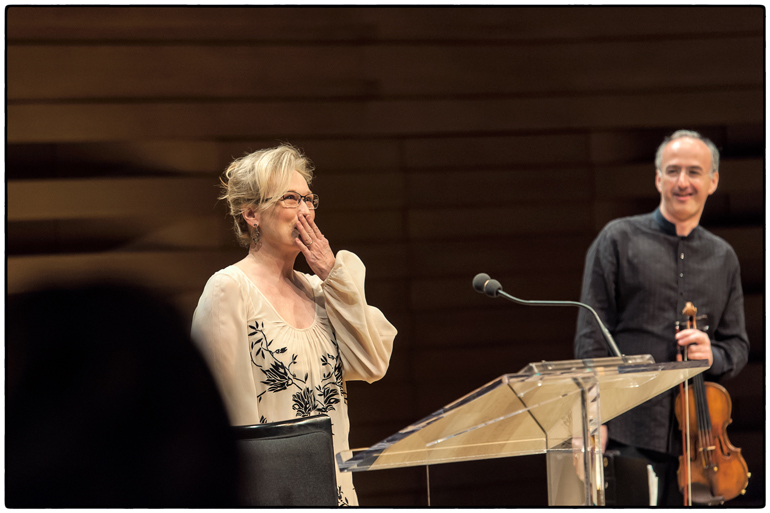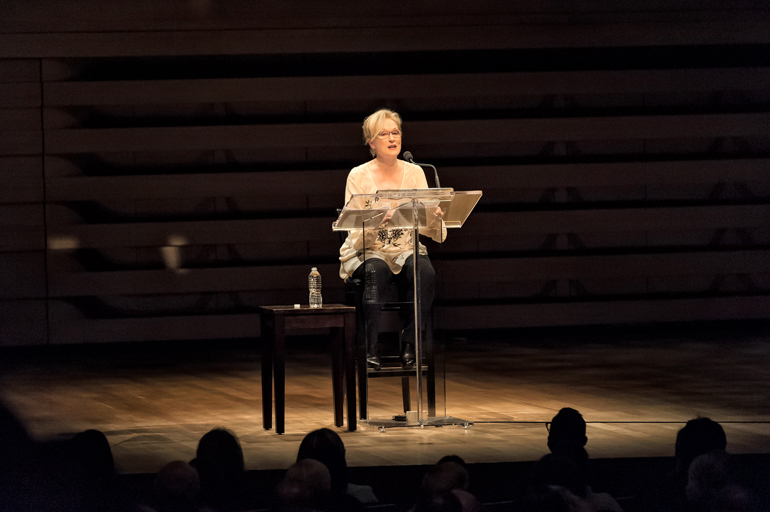
Royal Conservatory of Music: Meryl Streep and the Takács Quartet at Koerner Hall. Saturday, Oct. 17, 2015.
[Originally published in the Toronto Star]
There are few people who need as little an introduction as three-time Academy Award winner Meryl Streep. An actor’s actor, with a career that spans theatre, cinema and film production, she originally wanted to be an opera singer. Streep abandoned the idea after watching coloratura soprano Beverly Sills’ debut at New York City Centre.
Last night Streep took to the stage at Koerner Hall with the Takács Quartet to perform a series of readings from author Philip Roth’s death-obsessed 2006 novel, Everyman. It might not have been a singing voice, but it was a voice worth listening to.
“It’s best to give while your hand is still warm,” Streep read.
Excerpts were paired with four works from composers Pärt, Britten, Shostakovich and Schubert, performed by the Takács Quartet at Streep’s side.

It was a solemn, meditative evening devoted to the examination of life through death. It explored the bittersweet process of growing old and weighing the marks of life’s purpose against death’s ultimate finality. As a writer, Roth writes exceptionally well for women. The words transcended to become stories about all of us; Everyman.
Before settling into the opening Psalom by Arvo Pärt, the star-struck audience gave the 66-year old master soubrette a standing ovation before she even spoke a word.
The highlight was Shostakovich’s searching Recitative and Romance from his String Quartet No. 2. Staggered bow strokes marked the climax at the midsection and raised chills against a wandering melody in the first violin. Like the other interludes, this was distressed music, an unfinished hem whose imperfection makes it all the more beautiful.
Closing the musical interludes was the Andante con moto from Schubert’s powerful “Death and the Maiden.” An indictment of death, and written shortly before the composer died broke and young, the theme follows Roth’s words closely.
“My God, he thought, the man I once was!”
Lyrical and wandering, the Takács Quartet maintained a controlled release of energy of the second movement, which is about death’s words, rather than the struggle against the terror of it.
This combination of words and music is no accident. It’s a compelling relationship that represents the most successful marriage between seemingly separate art forms.
While Streep didn’t sing any arias, the spoken words — along with the dimming of the stage light and the softer side of the string quartet repertoire — left a weight upon the audience, who rose slowly and receded into the night.
“Old age isn’t a battle,” Streep read. “Old age is a massacre.”
A brief pause, then silence.
#LUDWIGVAN
Want more updates on Toronto-centric classical music news and review before anyone else finds out? Get our exclusive newsletter here and follow us on Facebook or Twitter for all the latest.
- THE SCOOP | Royal Conservatory’s Dr. Peter Simon Awarded The Order Of Ontario - January 2, 2024
- THE SCOOP | Order of Canada Appointees Announced, Including Big Names From The Arts - December 29, 2023
- Ludwig Van Is Being Acquired By ZoomerMedia - June 12, 2023



